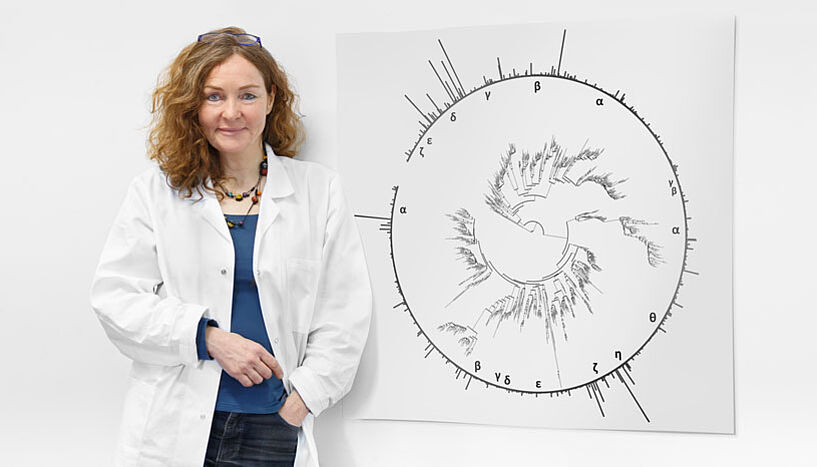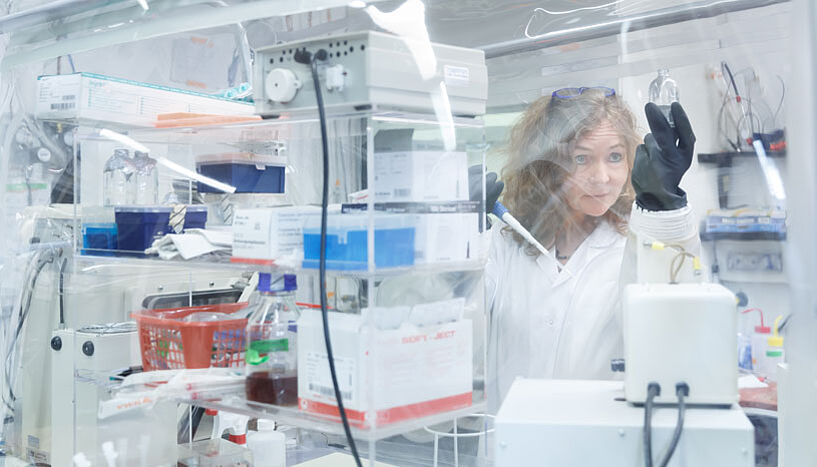ERC Advanced Grant for microbiologist Christa Schleper
30. März 2016Archaea expert Christa Schleper receives a highly prestigious ERC Advanced Grant from the European Research Council for an innovative research project.
Microbiologist Christa Schleper has been studying archaea for many years. Beside bacteria, these microorganisms are considered to be the first life forms on Earth. For a new, groundbreaking research project Christa Schleper now receives a 2.5 Mio Euro ERC Advanced Grant from the European Research Council. The money will be used for fundamental research: Christa Schleper and her team want to investigate recently discovered archaea that promise insights into early evolution of microorganisms and more complex life forms.
"The University of Vienna is happy to receive the 35th ERC-grant", says rector Heinz W. Engl. "These grants are a big award for the scientists and evidence for the University of Vienna's successful appointment policy. Moreover, young scientists get the opportunity to work on highly innovative research projects."
Christa Schleper's research project in focus
How more complex organisms such as plants and animals have developed from single, microbial cells, is one of biology's major unanswered questions. Archaea (like bacteria) are nucleus-free prokaryotic cells and considered to be the oldest organisms on Earth that arose about 3.5 billion years ago. The molecular structures of archaea exhibit astonishing similarities with those of plants and animals, so-called eukaryotes.
In her project 'TACK Superphylum and Lokiarchaeota Evolution - Dissecting the Ecology and Evolution of Archaea to Elucidate the Prokaryote to Eukaryote Transition' Christa Schleper analyzes two groups of archaea that promise to provide insights into important transitions in early evolution: Lokiarchaeota and Thaumarchaeota. Lokiarchaeota were discovered in deep sea sediments only in 2015 and are currently considered to be the closest relatives of eukaryotes. So far they can be merely predicted through molecular techniques but have not been cultivated in the laboratory yet.
Thaumarchaeota are the only archaea that have succeeded to radiate from a life in hot springs into moderate aerobic environments and they have an important ecological function in the nitrogen cycle in the ocean and in soils. "With the exploration of these two groups of archaea I expect to gain new insights into early evolution of eukaryotes and into ecologically relevant microorganisms", says Christa Schleper.
About Christa Schleper
Christa Schleper, born 1962 in Oberhausen/Germany, has been professor of genetics in ecology at the University of Vienna since 2007. 1989 diploma in biology at the University of Constance, 1993 doctorate at Max Planck Institute of Biochemistry in Munich, 1993-95 post doctorate at the MPI in Munich, 1995-97 post doctorate at California Institute of Technology (Caltech, USA) and University of Santa Barbara (USA). 1998-2003 Assistant Professor at the Darmstadt University of Technology, 2002 habilitation in microbiology and genetics, 2003-2007 Professor of Microbiology at the University of Bergen (Norway). 2001 EMBO Young Investigator Award, 2011 elected member of the American Academy of Microbiology, since 2013 corresponding member of the Austrian Academy of Sciences.
Christa Schleper is speaker of the Doctoral Programme (DK) "Microbial Nitrogen Cycling - From Single Cells to Ecosystems", funded by the Austrian Science Fund (FWF) with approx. EUR 1,5 million, that started in January 2016 with nine research groups of the Faculty of Life Sciences of the University of Vienna. Furthermore, a project funded by the Vienna Science and Technology Fund (WWTF) endowed with approx. EUR 1.6 million will start in summer for a Vienna Research Group on the topic "Pan-metabolic profiling of Archaea: The ecology of genomics", with molecular biologist Filipa Sousa as the group leader.
Schleper's main research interests are ecology, molecular biology and evolution of archaea, virus-host-interactions and metagenomic research of uncultivated microorganisms.
European Research Council
Funding of fundamental frontier research is one of the European Union's main foci. Therefore, the European Research Council (ERC) was established. The ERC Advanced Grant is the most important European research grant and financially supports projects with highest potential for innovation; it is awarded by an international referee panel of renowned experts. The selected researchers are given adequate freedom for the realization of their vision.
13 ERC Advanced Grants - a total of 35 ERC Grants for the University of Vienna
Christa Schleper is the 13th scientist at the University of Vienna to receive an ERC Advanced Grant. Further awardees of this research grant, that can been obtained since 2007, were Walter Pohl (History), Gerhard J. Herndl (marine biology), Herline Pauder-Studer and Martin Kusch (philosophy), Tecumseh Fitch (cognitive biology), Michael Wagner (microbial ecology), Anton Zeilinger and Markus Arndt (physics), Monika Henzinger (computer sciences) as well as Adrian Constantin, Walter Schachermayer and Ludmil Katzarkov (all mathematics). Thanks to 16 further ERC Starting Grants, five ERC Consolidator Grants and one ERC Proof of Concept the University of Vienna now holds 35 ERC Grants.
Further information: erc.europa.eu
Wissenschaftlicher Kontakt
Univ.-Prof. Dipl.-Biol. Dr. Christa Schleper
Department für Funktionelle und Evolutionäre ÖkologieUniversität Wien
1030 - Wien, Djerassiplatz 1
+43-1-4277-76510
+43-664-60277-76510
christa.schleper@univie.ac.at
Rückfragehinweis
Mag. Alexandra Frey
Media Relations ManagerUniversität Wien
1010 - Wien, Universitätsring 1
+43-1-4277-17533
+43-664-8175675
alexandra.frey@univie.ac.at
Downloads:
Gruppe_02.jpg
Dateigröße: 4,93 MB
Christa_Schleper_2_01.jpg
Dateigröße: 3,45 MB
Christa_Schleper_1_01.jpg
Dateigröße: 7,93 MB
Christa_Schleper_4_01.jpg
Dateigröße: 5,07 MB




